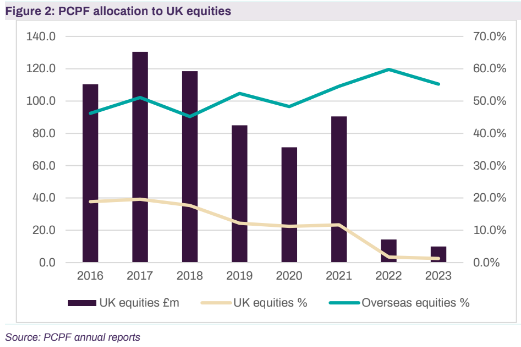‘Disastrous for the UK’: How the MPs’ pension fund abandoned Britain’s stock market

Jeremy Hunt and Rachel Reeves have been squaring up to the UK’s pension sector in recent months with threats to strong-arm money managers into backing homegrown British companies.
However, data suggests they might do well to start closer to home.
The MPs’ pension fund – the Parliamentary Contributory Pension Fund (PCPF) – which pools MPs’ retirement cash and counts the chair of the Treasury Select Committee Harriet Baldwin among its trustees – has ditched UK equities rapidly over the past seven years.
At its peak in 2017, the fund held £130m in UK equities. However, at the last year-end, this had cratered by 92 per cent to only £10m.
That equity holding represents a 1.3 per cent weighting to UK equities of its total and just 2.3 per cent of its total equity portfolio, meaning the fund has dramatically tilted its allocation towards overseas stock markets, according to Peel Hunt, which analysed the data.
The figures will likely embarrass lawmakers in the UK who have been banging the drum for more domestic investment in Britain in recent years. At his budget in march, the Chancellor Jeremy Hunt outlined plans to force domestic pension funds to disclose the geographic make-up of their investments by 2027 in a bid to boost domestic investment.
However, the figures from the MPs’ pension pot suggest Westminster’s own retirement fund may fall below the average UK allocation.
“This means that not only has the fund sold down its UK holding to a very low level, but also that it is materially underweight vs the UK’s share of global equities,” said Charles Hall, head of research at Peel Hunt.
“In some ways its similar to the Coutts decision to move to a global fund allocation. May work for them but disastrous for the UK!”
Coutts diverted its funds away from the UK earlier this year. Hall added that most MPs would likely be “astounded” to realise how little their pension pots were invested in UK stocks.

Pension investment has become a political football between both parties as Westminster looks to spur a wave of investment into the London Stock Exchange and the UK’s start-ups.
A near £2.5 trillion pool of capital locked up in the funds is seen as a potential game changer in solving London’s public market malaise. After accounting changes in 2000, pension funds have dramatically fled the UK’s stock market in favour of safer bond holdings.
Just four per cent of UK equities is now held by pension funds, down from 39 per cent 20 years ago, according to the think tank New Financial.
In its manifesto yesterday, the Labour Party suggested it would push ahead with the government’s push to shake-up domestic pension investment, something left out of the Tory manifesto.
Last year, the Conservative government coerced ten of the top pension money managers in the City to commit five per cent of their assets to UK growth companies, a move that Rachel Reeves had previously backed.
“Labour is supportive of the direction of travel from the Conservative Mansion House speech – seeking to drive UK pension funds to invest in UK assets – something not mentioned in the Conservative Manifesto,” said Adrian Kennet, director of Dalriada Trustees.
A spokesperson for the House of Commons said:”In common with most large diversified investors, the PCPF has financial exposure to a number of companies, sectors, and geographical locations including the UK.
“The PCPF invests in a wide range of asset classes on a global basis, including illiquid and alternative asset classes. Besides listed equities, the fund invests in a range of productive assets, including a 10 per cent allocation to UK properties and 10 per cent committed capital in infrastructure funds, which include UK investment.”